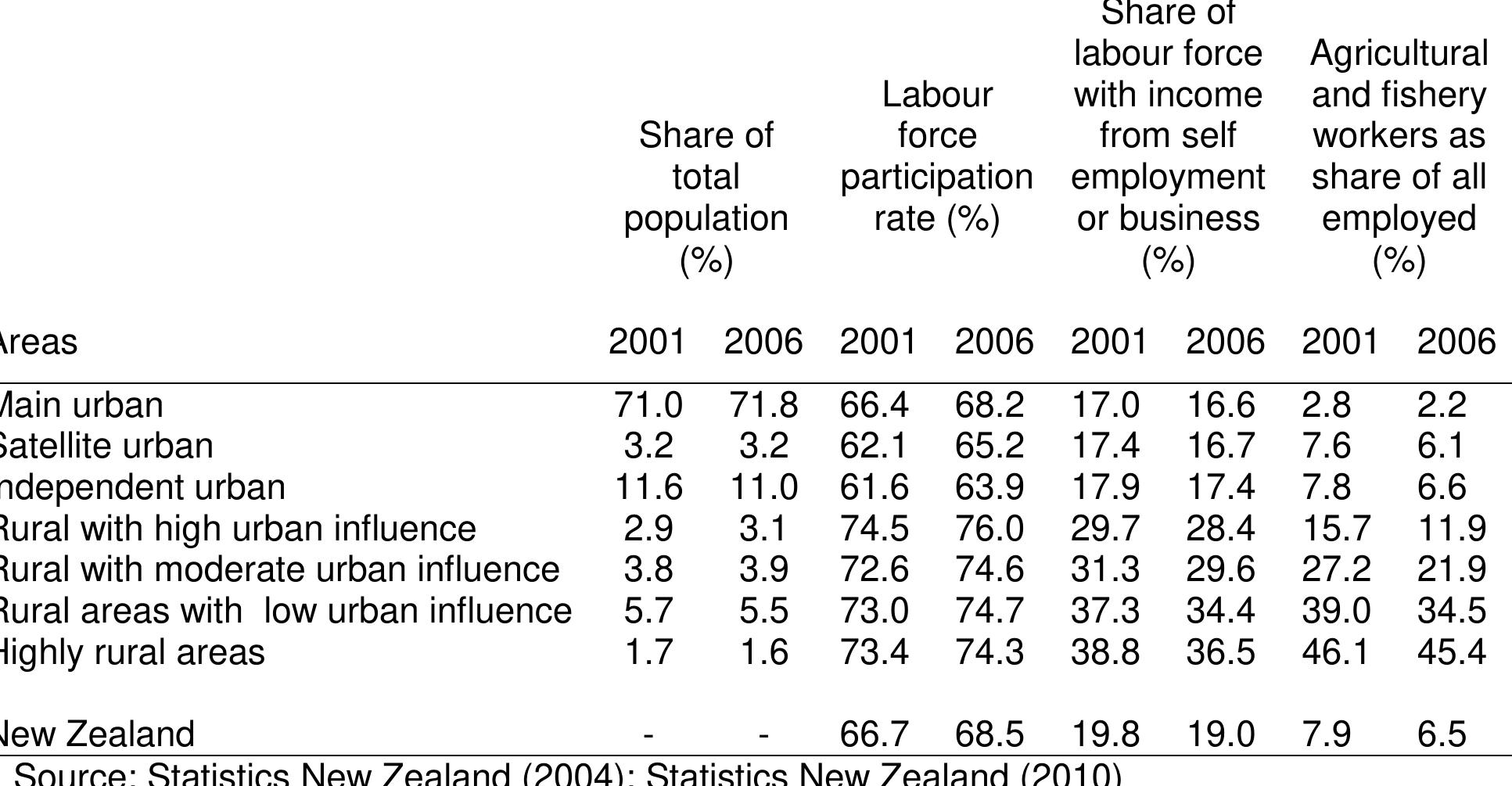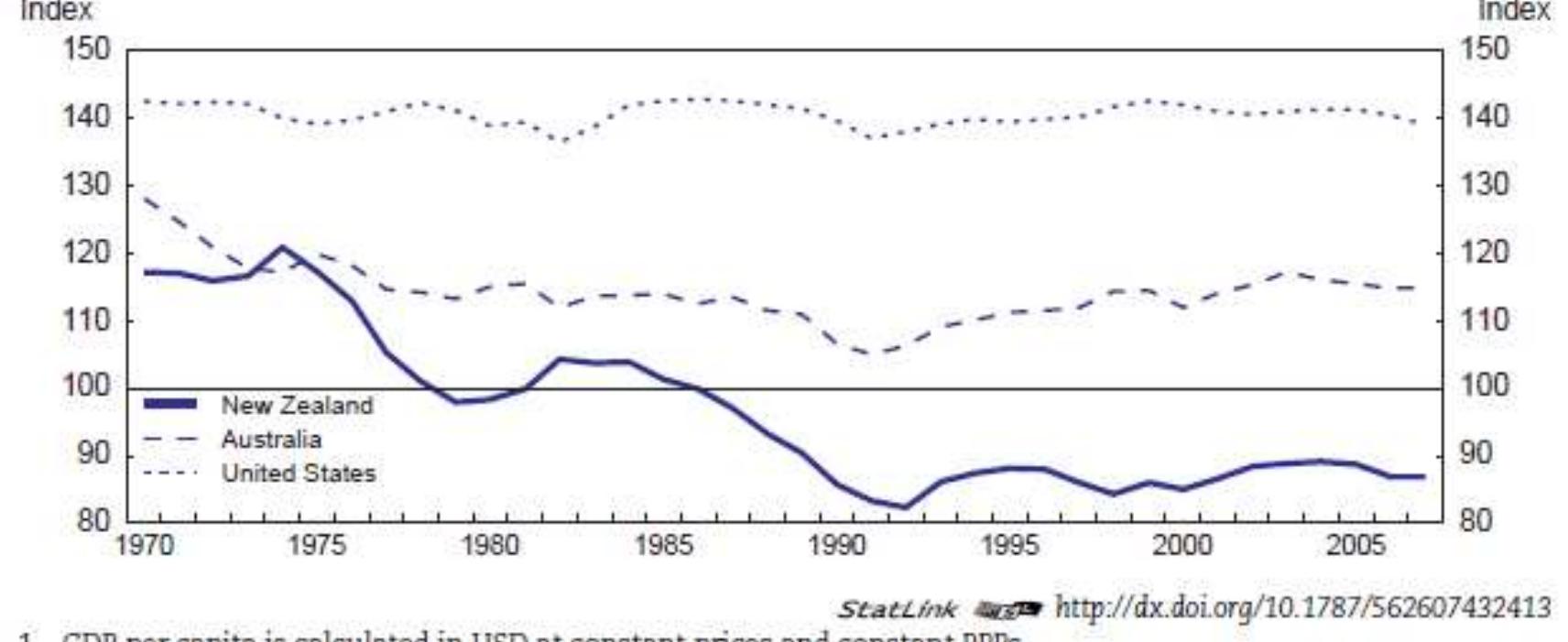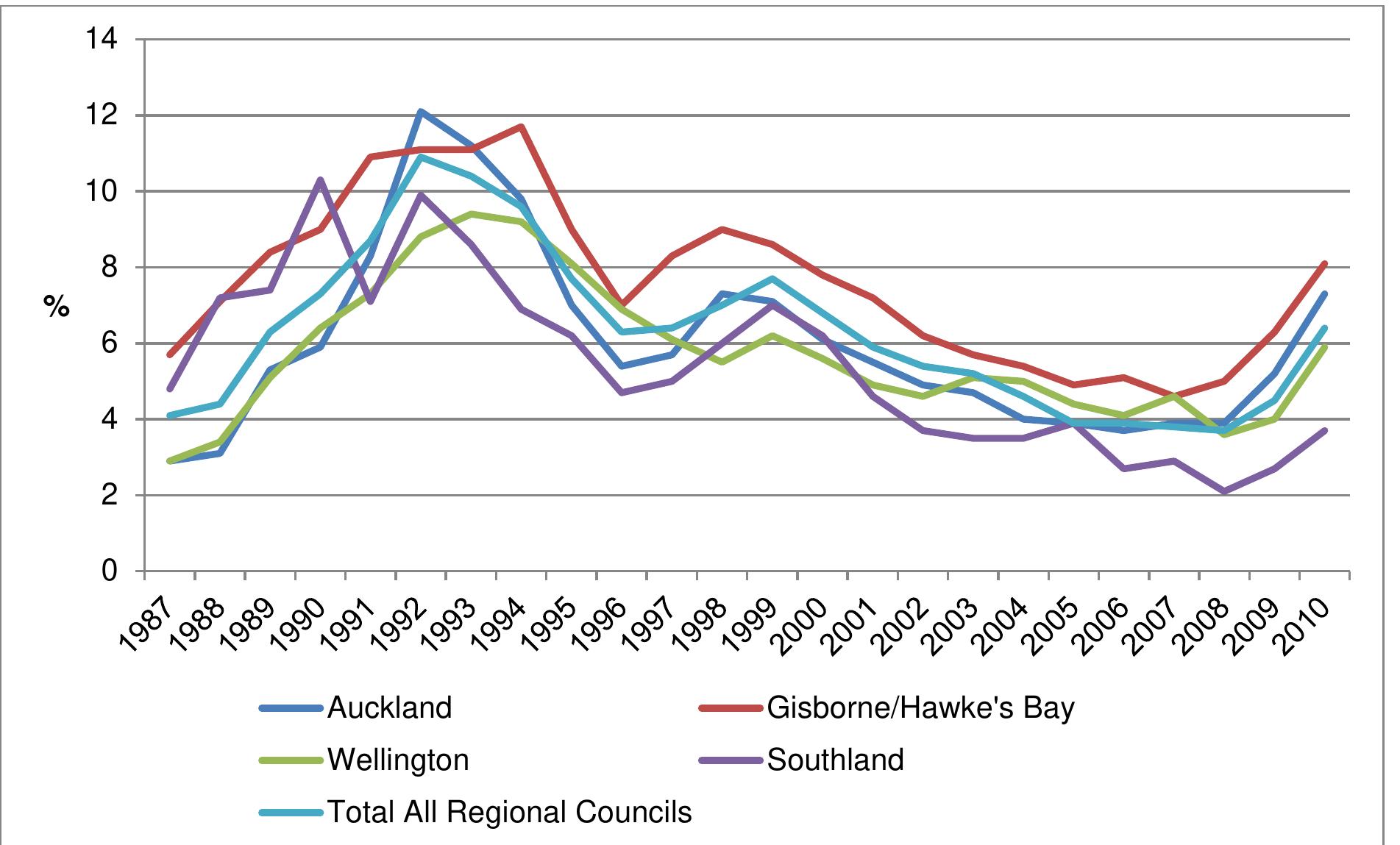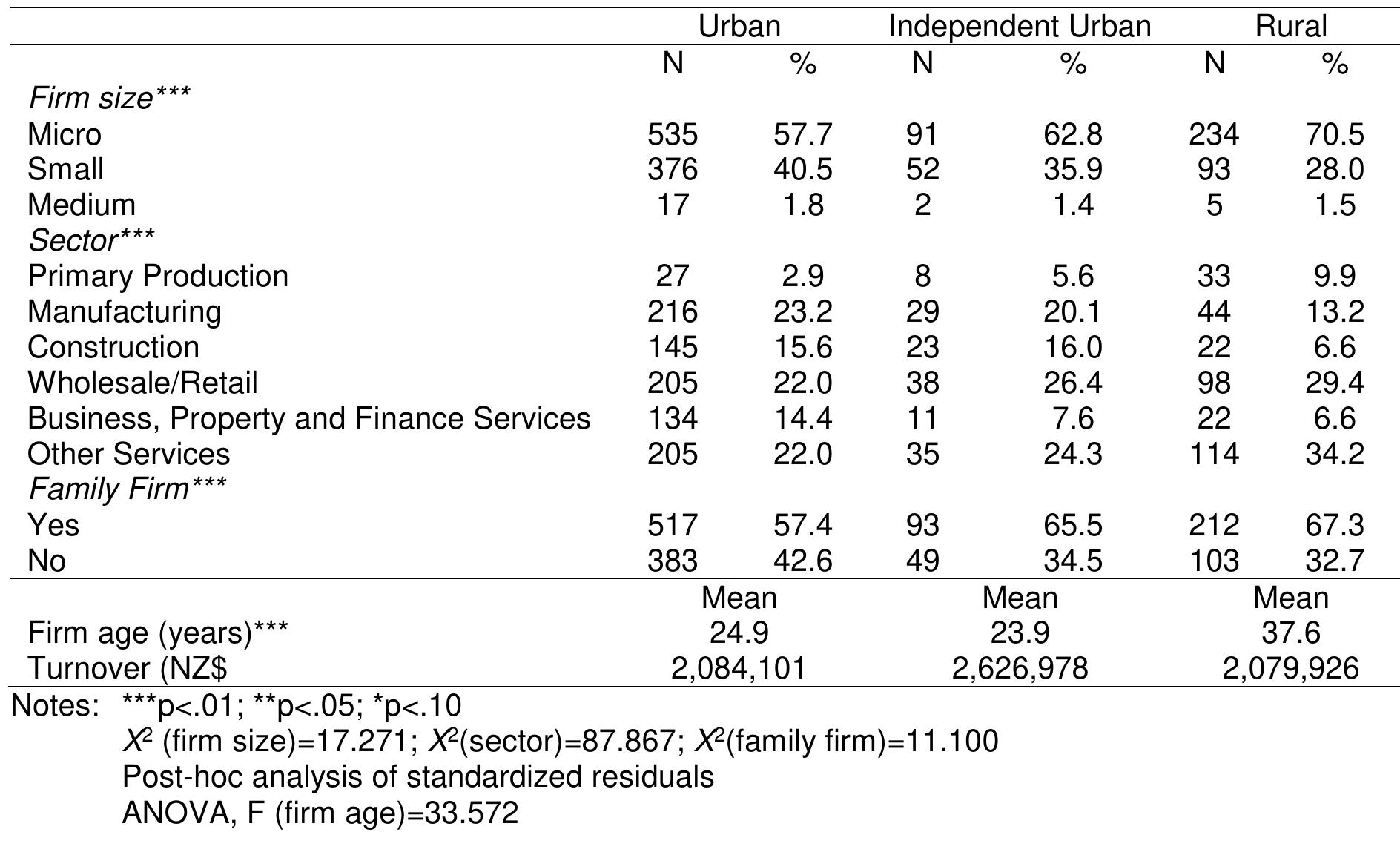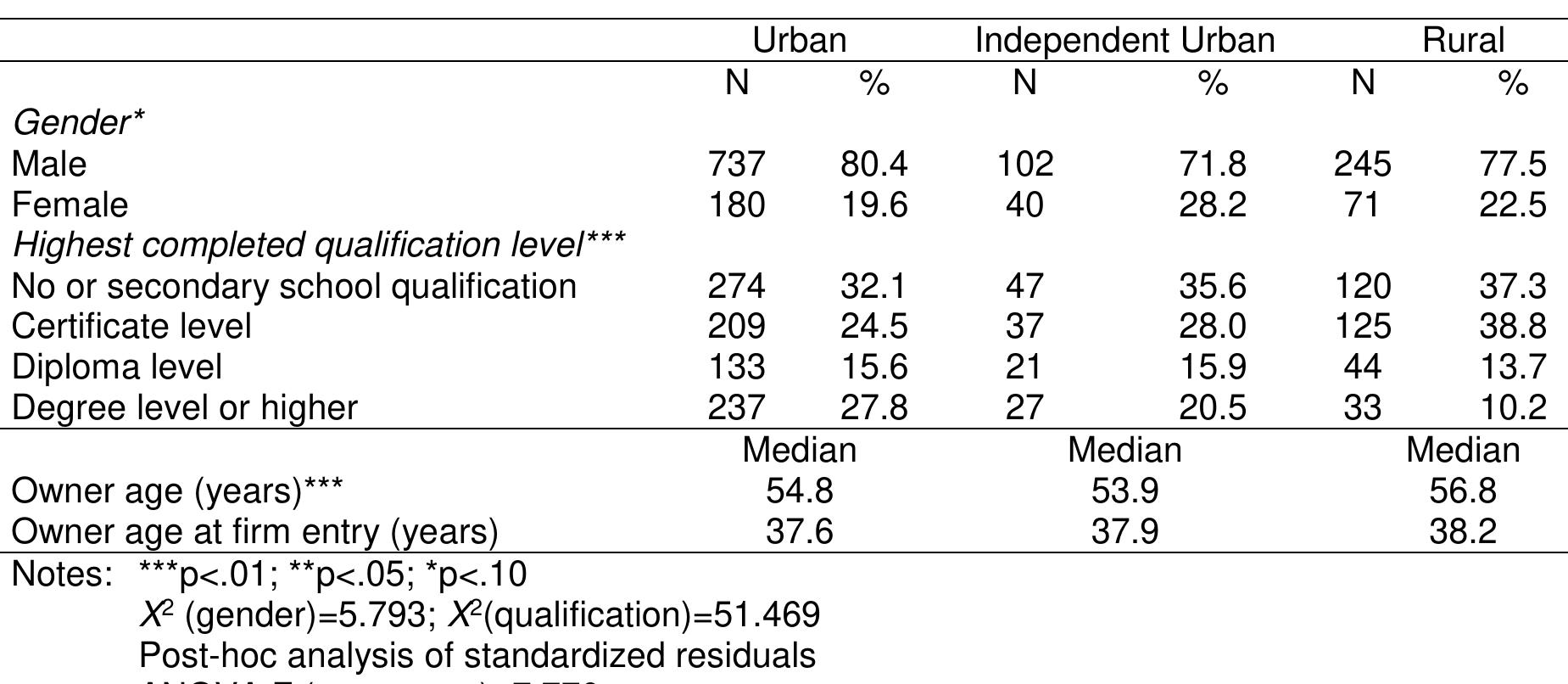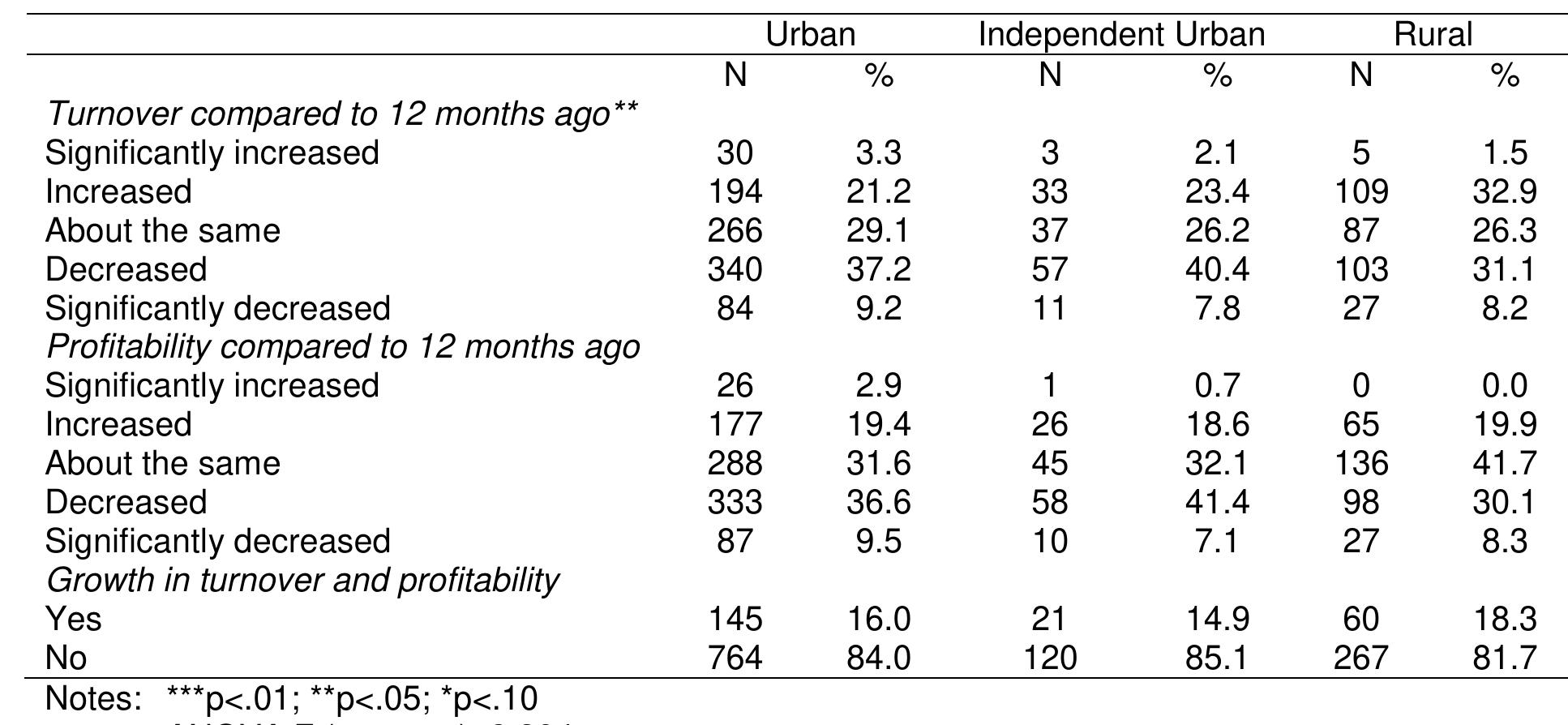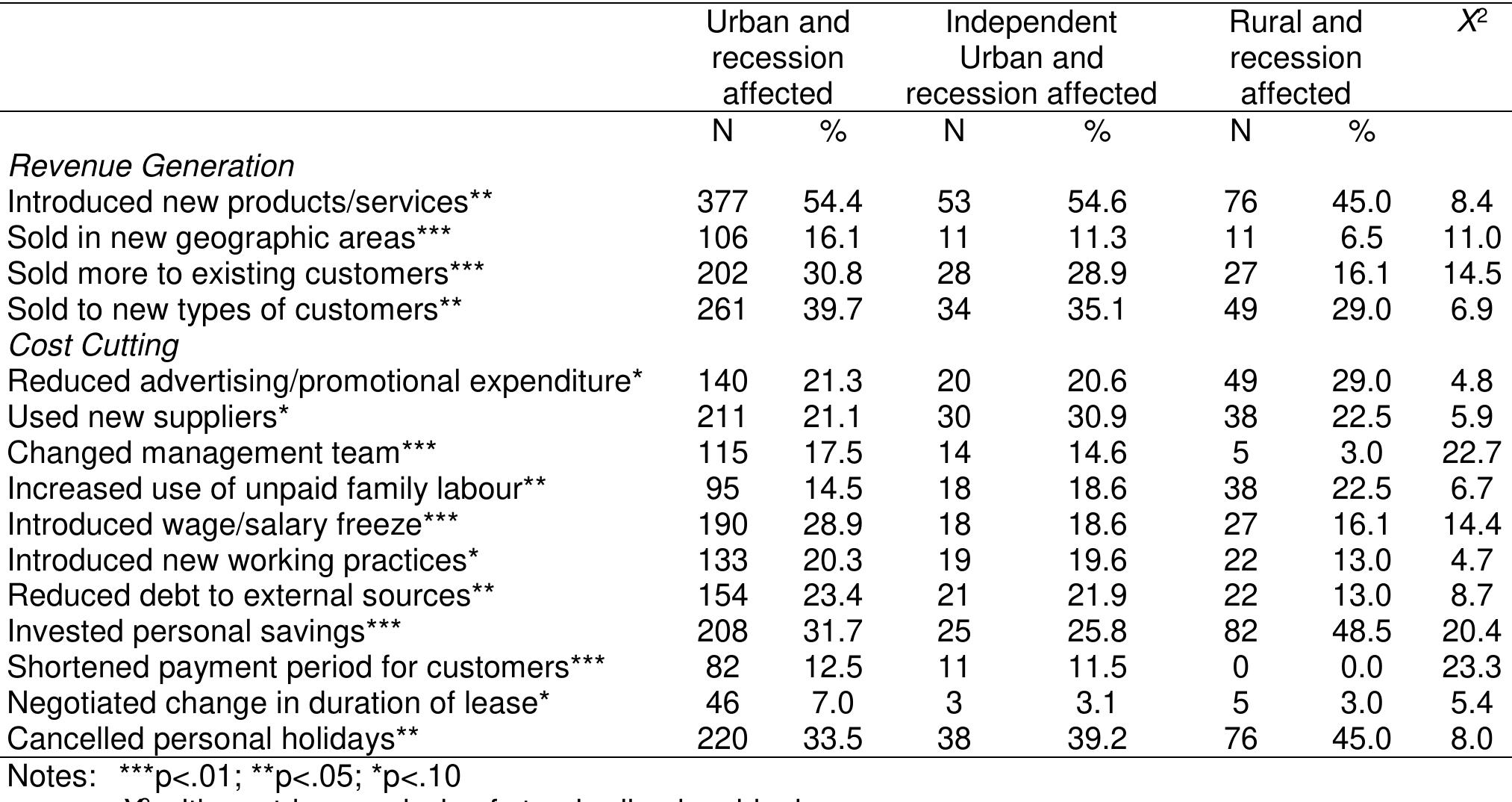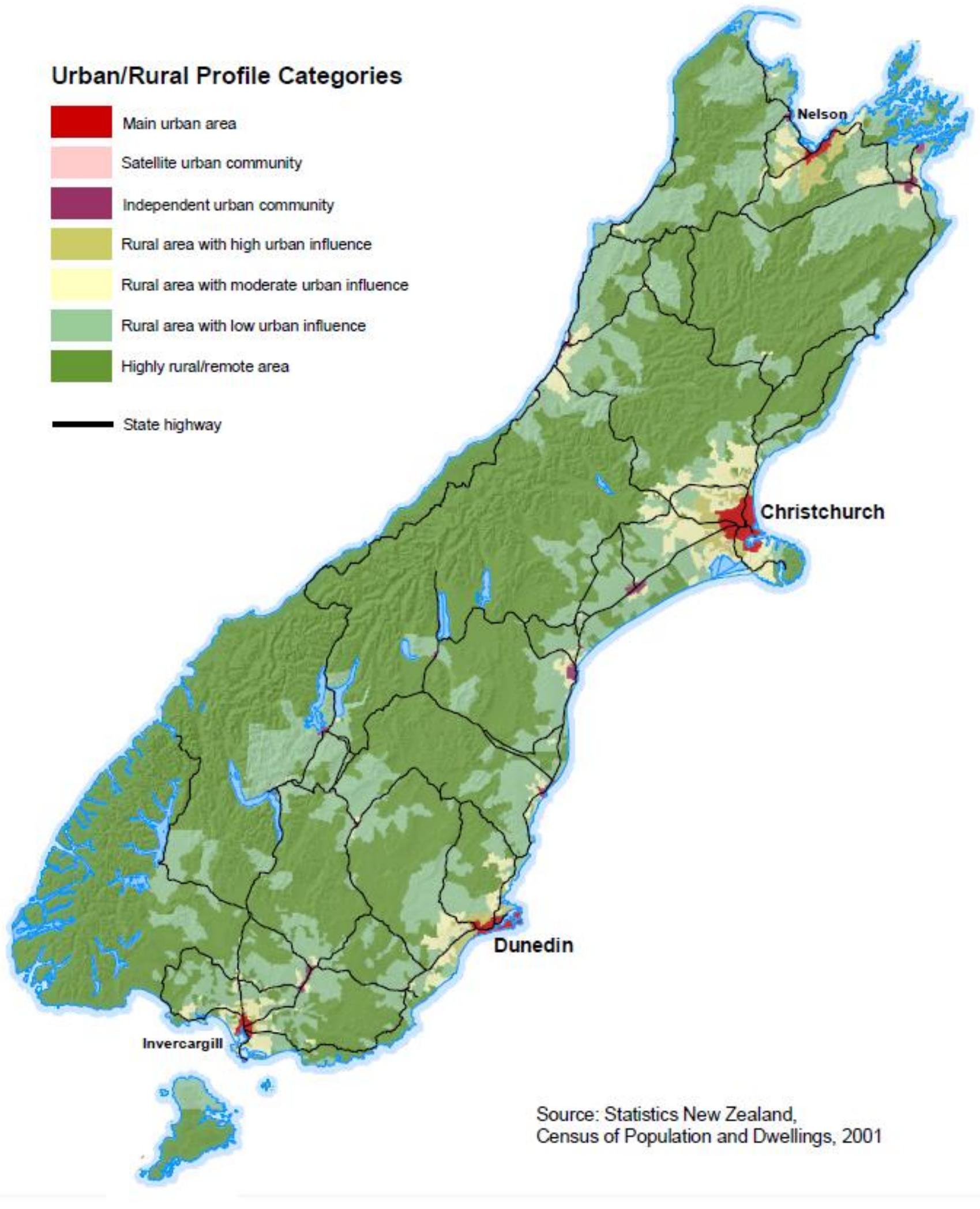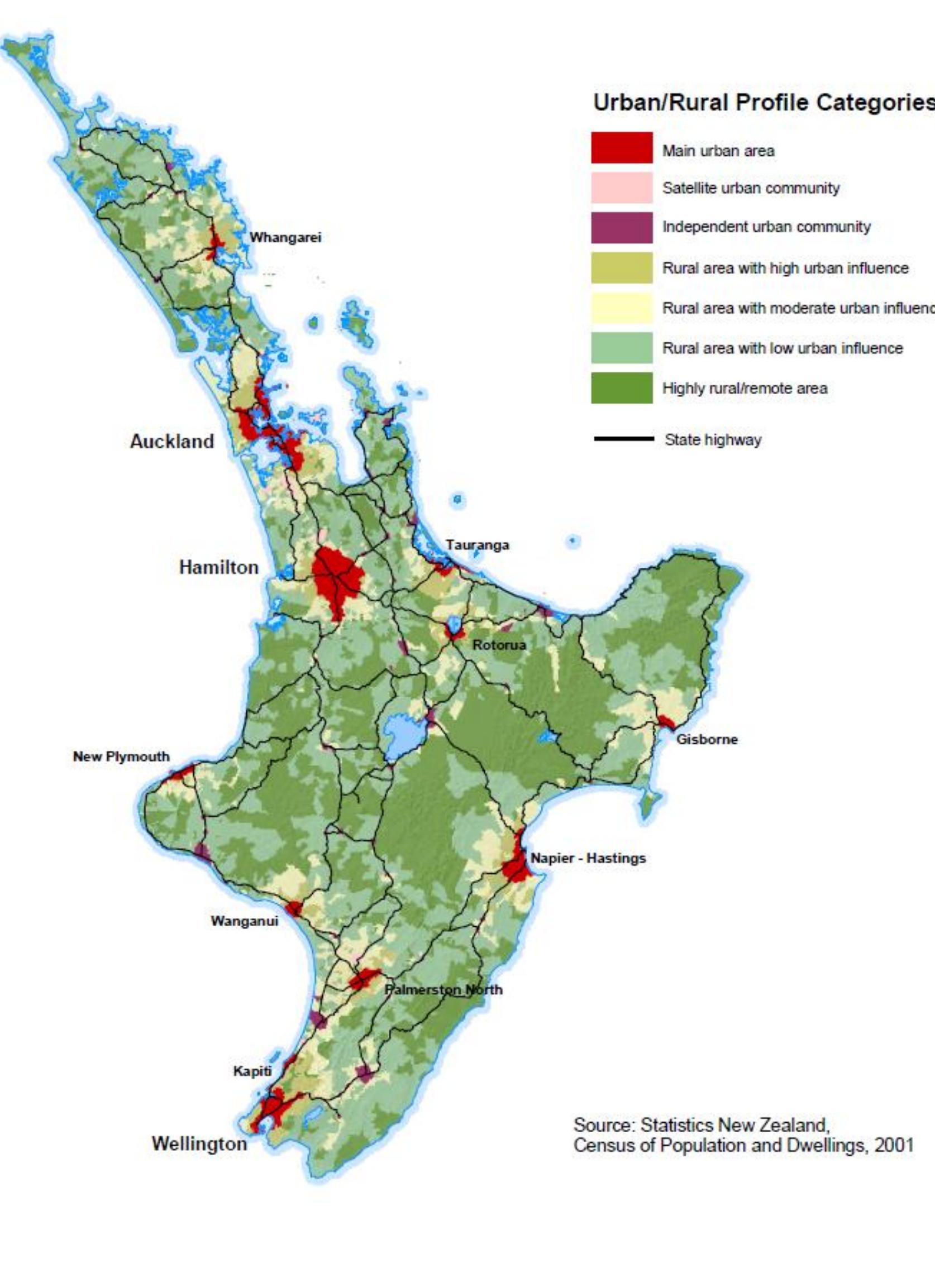The sustainability of small businesses in recessionary times (original) (raw)
Abstract
AI
This paper investigates the strategic behavior of rural SMEs in comparison to urban SMEs during recessionary periods in New Zealand. Utilizing data from a national survey of 1411 SMEs, it provides empirical evidence regarding the distinctiveness and sustainability of rural SMEs in difficult economic conditions. The findings contribute to knowledge on SME strategies and highlight the importance of rural enterprises within the broader economic landscape.
Figures (13)
4.2 The Economic Context: Features of New Zealand’s Economy
OECD? = 100, at constant 2000 Purchasing Power Parities and constant prices
In the four years to 2008, New Zealand recorded an annual average rise of 3.5 percent in real GDP in one of its most sustained periods of economic growth (OECD, 2009). As well as booming commodity prices, at least for some key exports, this performance was assisted by favourable economic conditions in Australia, New Zealand’s single most important overseas market, a housing sector boom and record immigration. New Zealand’s shift in economic fortune began prior to the world financial crisis in response to heavy pressure on production capacity through wage demands and skill shortages, currency appreciation and a tightening of monetary policy designed to curb inflation (OECD, 2009). The economy has nonetheless avoided some aspects of the international financial crisis that unfolded during 2008 as a consequence of the low level of public debt and the comparatively strong position of the Australian banks that dominate the financial sector in New Zealand. The Australian banking sector has avoided the need for the nationalisations and capital injections that have occurred in Europe and North America. In 2009 the current account deficit amounted to 10 percent of GDP and, while this is expected to increase, it allowed the government to inject a large ‘fiscal stimulus’ into the economy during 2009. A cumulative GDP decline of 3.3 percent was experienced from December 2007 to early 2009 (Treasury, 2010). Unemployment increased from 3 percent to 6.5 percent by the third quarter 2009, peaked in early 2010 and has since fallen to slightly over 6 percent. Another immediate and partly short-lived impact of the financial crisis was a sudden drop in net migration and short term visitor arrivals (figure 1). Figure 3: Unemployment rate by region 1987-2010
Table 4: Firm Size and Sector by Urban and Rural Location
Table 5: Owner characteristics of rural and urban firms Educational qualification patterns of owner-managers were significantly different between urban, independent urban and rural areas. While rural areas had a higher amount of owner- managers with a national certificate, trade certificate or equivalent urban areas had a higher amount of owner-managers with a degree level or higher. The educational qualification pattern of owner-managers in independent urban areas was closer to the ones in urban areas.
Table 6: Comparative Business Performance in Q4, 2009 compared to Q4, 2008 Respondents were asked to compare their firm’s performance i.e. turnover and profitability to 12 months ago and to indicate on a five-point Likert scale whether their performance had increased, stayed the same or decreased. The results indicated that the recession did not affect all firms equally, but that there is a range of performance outcomes. Overall, more firms reported decreased, rather than increased, performance with regard to turnover and profitability. Some firms, however, actually reported increased performance during the last 12 months: 27 percent of firms reported increased turnover and 21.5 percent of firms increased profitability. A slightly smaller number of firms - 16.4 percent - reported growth i.e. increased turnover and profitability.
Further, respondents were asked to indicate what their main source of competitive advantage was during the economically challenging times. While the firms across the three locations agreed in principle what the main three sources were (i.e. established customer relationships, quality of product/service and uniqueness of product/services) we found some distinctive differences as well. Although location didn’t rank very high as a competitive advantage, independent urban and rural firms (6.2 percent and 8.1 percent respectively) were significantly more likely to agree compared to urban firms. Further, rural firms were less likely to see price and the quality of product/services as a competitive advantage compared to urban and independent urban firms.
Table 8: Main source of competitive advantage during recession
North Island

Loading Preview
Sorry, preview is currently unavailable. You can download the paper by clicking the button above.
References (51)
- 0 Notes: ***p<.01; **p<.05; *p<.10 X 2 with post-hoc analysis of standardized residuals
- Anderson, A.R., Ossiechuk. E. & Illingworth, L. (2010) "Rural Small Businesses in Turbulent Times: Impacts of the Economic Downturn", The International Journal of Entrepreneurship and Innovation, vol 11, no 1, pp 45-56
- Atterton, J. & Affleck, A. (2009) Rural Businesses in the North East of England: Final Survey Results, Newcastle, Centre for Rural Economy, Newcastle University Barney, J. (1991) "Firm resources and sustained competitive advantage", Journal of Management, vol. 17, pp 99-120.
- Byrom, J., Medway, D., & Warnaby. G. (2003) Strategic alternatives for small retail businesses in rural areas", Management Research News, vol. 26, no 7, pp 33-49
- Cameron, A. (2005) "Farmers' Markets as Small Business Incubators and 'Reverse' Incubators-Evidence from New Zealand", paper presented to the 4 th Rural Entrepreneurship Conference, Aviemore.
- Cook, A. & Fairweather, J. (2005) Characteristics of smallholdings in New Zealand: results of a nationwide survey, Research Report 278, Agricultural Economics Research Unit, Christchurch: Lincoln University.
- Cosh, A. & Hughes, A. (2000) "British Enterprise in Transition: Growth, Innovation and Public Policy in the Small and Medium Sized Enterprise Sector 1994 -99," ESRC Centre for Business Research, University of Cambridge.
- Countryside Agency (2003) Stepping Stones Report, Countryside Agency (now Commission for Rural Communities), Cheltenham, England.
- Courtney, P. & Errington, A. (2000) "The Role of Small towns in the Local Economy and Some Implications for Development Policy", Local Economy, vol; 15, pp 280-301
- Evans, L., Grimes, A., Wilkinson, B., & Teece, D. (1996). Economic reform in New Zealand 1984-95: The pursuit of efficiency, Journal of Economic Literature, 34, 1856-1902.
- Florida, R. (2002) The Rise of Creative Class, Basic Books, New York, US
- Galloway, L., Mochrie, R. & Deakins, D. (2004) 'ICT-enabled collectivity as a positive rural business strategy', International Journal of Entrepreneurial Behaviour and Research Vol 10, no 4, pp 247-259.
- Galloway, L., Sanders, D. & Deakins, D. (2011) "Rural small firms' use of the internet: from global to local", Journal of Rural Studies, vol 30 (in press).
- Granovetter, M. (1973) "The strength of weak ties", American Journal of Sociology, vol 78, pp 1360-80
- Guthrie, J., Guthrie, A., Lawton, R. & Cameron, A. (2006) Farmers' markets: the small business counter-revolution in food production and retailing, British Food Journal, 108(7): 560-73.
- Howell, B. (2001). "The rural-urban 'digital divide' in New Zealand: fact or fable?" Prometheus: Critical Studies in Innovation, vol 19, no 3, pp 231-251.
- Kalantaridis, C. (200) "In-migration, Entrepreneurship and Rural-urban Interdependencies: The Case of East Cleveland, North East England", Journal of Rural Studies, vol 26, pp 418- 27.
- Keen, D. (2004). The interaction of community and small tourism businesses in rural New Zealand. In R. Thomas (Ed.), Small firms in tourism: International perspectives. The Netherlands: Elsevier.
- Kitching, J., Smallbone, D. & Xehenti, M. (2011) "Have small businesses beaten the recession?", paper presented to ISBE Conference, Sheffield.
- Leipins, R (2000) "New Energies for an Old Idea: Reworking Approaches to 'Community' in Contemporary Rural Studies", Journal of Rural Studies, pp 23-35
- Maskell, P., Eskelin, H., Hannibalsson, I., Malmberg, A. & Vatne, E. (1998) Competitiveness Localised Learning and Regional Development, London: Routledge.
- McAuley, R. (2003) "Social constructions of environmental quality and opportunities for enterprise in rural Scotland", unpolished PhD thesis, Open University Ministry of Agriculture and Forestry (2004) A Study of Smallholdings and their Owners, Wellington: Ministry of Agriculture and Forestry Ministry of Agriculture and Forestry (2009) Contributions of the Land-Based Primary Industries to New Zealand's Economic growth, Wellington: Ministry of Agriculture and Forestry. Ministry of Economic Development (2009) SMEs in New Zealand: Structure and Dynamics 2009, Wellington, Ministry of Economic Development.
- Mitchell, S. & Clark, D. (1999) "Business adoption of information and communications technologies in the two-tier rural economy: some evidence from the South Midlands," Journal of Rural Studies, 15, pp 447 -455.
- Moran, W. (1997) 'Farm size change in New Zealand', New Zealand Geographer 53(1): 3-
- OECD. (2007). OECD Reviews of Innovation and Policy: New Zealand. OECD, Paris. OECD (2008) OECD Rural Policy Reviews: Scotland UK -Assessment and Recommendations, OECD, Paris.
- OECD (2009) OECD Economic Surveys New Zealand, Volume 2009/4. Paris: Organization for Economic Cooperation and Development.
- Paddison, A. & Calderwood, E. (2007) "Rural retailing: a sector in decline" International Journal of Retail & Distribution Management, vol. 35 no 2, p136-155
- Page, S., Forer, P. & Lawton, G. (1999) Small business development and tourism: terra incognita, Tourism Management 20: 435-459.
- Powe,, N. A. & Shaw, T (2004) "Exploring the Current and Future Role of market Towns in Servicing their Hinterlands: a case study of Alnwick in the North East of England" Journal of Rural Studies, 20 pp 405-18
- Raley, M. & Moxey, A (2000) Rural Microbusinesses in North East England: Final Survey Results, Newcastle, Centre for Rural Economy, Newcastle University Ramasamy, S., Krishnan, V., Bedford, R., & Bedford, C. (2008). "The recognised seasonal employer policy: Seeking the elusive triple wins for development through international migration". Pacific Economic Bulletin, vol 23, no 3, pp 171-186.
- Rhodes, D. & Journeaux, P. (1995). Off-farm income survey:1992/93 financial year. MAF Policy Technical Paper 95/6. Wellington, New Zealand: Ministry of Agriculture.
- Roberts, S. (2002) "Key Drivers of Economic Development and Inclusion in Rural Areas," DEFRA, London.
- Rowe, J. (2005) Economic development from a New Zealand perspective, in J. Rowe (ed.) Economic Development in New Zealand. Aldershot: Ashgate.
- Sanson, R., Cook, A. & Fairweather, J. (2004) A Study of Smallholders and their Owners, Research Report, Agriquality Ltd.
- Shane, S. (2000) "Prior Knowledge and the Discovery of Entrepreneurial Opportunities", Organisation Science, vol 11, no 4, pp 448-469
- Shiblaq, F. & Fielden, K. (2008). ICT provision in a rural community: A New Zealand case study. Paper presented at the IADIS International Conference ICT, Society and Human Beings, Amsterdam, The Netherlands.
- Simmons, G. (2004) The impact of scale and remoteness on New zealand's industrial structure and firm performance, in J. Poot (ed.) On the Edge of the Global Economy, Cheltenham: Edward Elgar.
- Skilling, D (2001) The Importance of Being Enormous: Towards anUnderstanding of the New Zealand Economy, Treasury Discussion Paper, Wellington: New Zealand Treasury.
- Stokes, D. Small Business Management, 4/e Thomson Publishing Smallbone, D., North, D., Baldock, R. & Ekanem, I. (2002) "Encouraging and Supporting Enterprise in Rural Areas," Middlesex University Business School Research Report for the former DTI's Small Business Service, London.
- Sparkes, A. & Thomas, B. (2001) "The use of the Internet as a critical success factor for the marketing of Welsh agri-food SMEs in the twenty-first century," British Food Journal, 103, pp 331 -347.
- Statistics New Zealand (2004). New Zealand: An urban/rural profile. Wellington, New Zealand: Statistics New Zealand.
- Statistics New Zealand (2004) New Zealand: An Urban/Rural Profile, Wellington: statistics New Zealand.
- Statistics New Zealand (2010) New Zealand's Population, Wellington: Statistics New Zealand. (http://www.statistics.govt.nz)
- Talbot, H (2008) "The perpetual rural Broadband gap", paper presented at the 6 th Rural Entrepreneurship Conference, Dumfries.
- Taylor, N. & McCrostie-Little, H. (1997) Entrepreneurship in New Zealand Farming: A Study of Alternative Enterprises on Farms, MAF Policy Technical paper 97/7a, Wellington: Ministry of Agriculture and Forestry.
- Telford, R. (2006) "Small businesses in rural areas -how are they different?", paper presented at the 26 th ISBE Conference, Cardiff.
- New Zealand Treasury. (2010). Monthly economic indicators: January 2010. Wellington, New Zealand: The Treasury.
- Treeby, B., & Burtenshaw, M. (2003). Comparative study on rural education and rural enterprises development: New Zealand country report and case study (Working Paper). Lower Hutt, New Zealand: The Open Polytechnic of New Zealand.
- Vaessen, P. & Keeble, D. (1995) "Growth-oriented SMEs in Unfavourable Regional Environments," Regional Studies, 29: 489 -505.
- Walsh, P (1988) 'Technology and the competitiveness of small countries: review', in C Van Freeman and B-A Lundvall (eds) Small Countries Facing the Technological Revolutions, London: Pinter
- Williams, C. & Nadin, S. (2011) "Evaluating the nature of the relationship between informal entrepreneurship and the formal economy in rural communities." International Journal of Entrepreneurship and Innovation, Vol. 12 (2) pp 95-103.
